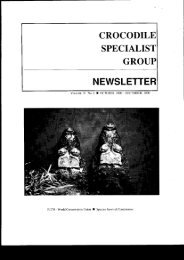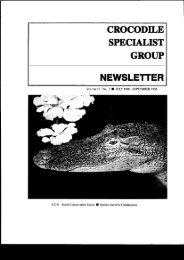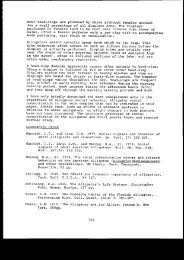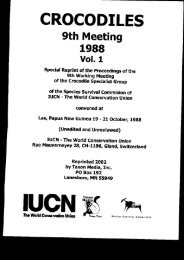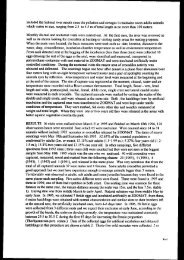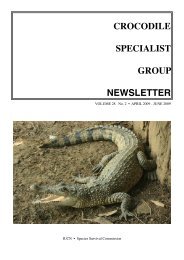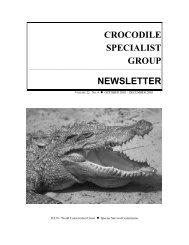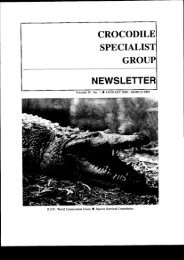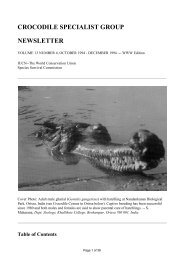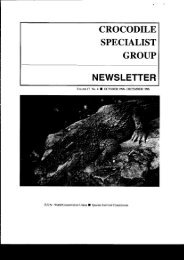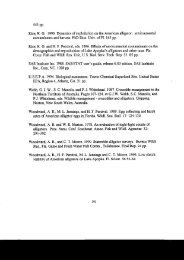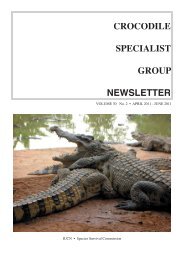size: 5036KB - Crocodile Specialist Group
size: 5036KB - Crocodile Specialist Group
size: 5036KB - Crocodile Specialist Group
You also want an ePaper? Increase the reach of your titles
YUMPU automatically turns print PDFs into web optimized ePapers that Google loves.
114<br />
with a shift fiom terrestrial to aquatic invertebrates<br />
their diet High water level were<br />
associatedwithincleasedamountsolfoodinthestomachs.Thiswascontrarytowhatwas<br />
e*pecteO as tfte frigft *ater peliod occurs during $e cool season and itx'as.suggested that any<br />
effects of the cool season are masked by the high temperatures ln the zamDez' vallev'<br />
The importance offish in the diet ofcrocodiles increases while they are between 700 mm sVL<br />
and 1300 mm SVL and, when estimated by weight, accounts for 98 % ofthe diet This figure<br />
declinestoaround33%inadultcrocodiles'Therewasnocompellingevidencetosupport<br />
Cott's (1961) tbeory that they frequently eat cl?Lriids lt should be noted that this was the first<br />
.toJV f"eriitg in-large Nile cromdiles that did not require wholesale slaughter in ihe name<br />
of science "'f (Gani and Pooley, 1976). The Mozambican data (taken from a commercial cropping<br />
*iri"tt ttti. rtudy did not initiate or support) confirmed these conclusions and helped<br />
"i"r"ir" io pui"onna"n"" in the smaller sub-adult sample from Lake Kariba Political problems in<br />
Mo)ambique unfortunately meanthat sample was only collecle during a single time of year<br />
but this m;kes the data more comparable with Coft's (1961) data'<br />
DIGESTION<br />
Rates of digestion were investigated in different <strong>size</strong> classes of crocodiles The el'fbct of<br />
i"rnp".utu."_una integument type of the prey on digestion rate was ascertained,<br />
juvenile<br />
croiodiles. Fish were digested to l0 % of their original volume atier 2 days in the stomacn'<br />
This information was necessary ln oroer rc be able to assign an age to prey items found in wild<br />
crocoalile stomachs and it was used to estimate feeding frequencies<br />
CONDITION<br />
Condition in juvenile crocodiles was significantly affected by water level butnot by season'<br />
-omparisonsi"t*een ttte hot Zambeziv;lley and the cooler Lake Ngezi showed that the Ngezi<br />
uni.uft (iuiog in less than ideal conditions at the edge of their demographic range) wele in<br />
better conditio-n. It is hypothe<strong>size</strong>d that this could be attributed to the presence of crabs in Lake<br />
Ngezi which make up 51 % oftheir diet at this Iocality (Hutton, 1984)'<br />
GROWTH ANID AGEING<br />
Using skeletochronology (Hutton, 1986; Garnes' 1991) itwas shown that crocodiles Srew faster<br />
in thiZarnbezi valley lboth study sites) and matrred some 15 years earlier than in Lake Ngezi'<br />
It appeaied that juve;iles grew slowly for the first two years and then the growth rate increased<br />
untiiabout I . iL uft". *tti"h it declined again. Females matured at between 15 and 20 years<br />
of age. The growth cufles constructeal from t'emurs from Calora Bassa were similar which<br />
sugg-ests thaathey may be a true representation of growth in wild Nile ctocodile's lt was<br />
est]irated that a iemati crocodile in Lake Kariba will spend 6 % of her life as a juvenile, 19<br />
% as a sub-adult ?|Ild75% as an adult. As males gmw quicker they will spend 6 % as<br />
iuveniles. ll % as sub-adults and 83 % as adults (average life span assumed to be 80 years)'<br />
FEEDING FRDQI,'ENCY AND COMPETITION WITH TIIE ARTISANAL FISIIERY<br />
Wild juvenile crocodiles ate small amounts of fbod compared to captive juveniles where they<br />
*erc'lfd ad lib but tte data suggestiat they were more efficient at converting it Using the<br />
feeding frequencies an annual estimate ol fish consumption fiom Lake Kariba was poposed<br />
(mean-= 1i0.14 tonnes; upper estimate 22539 tonnes). This was the first time that this had



